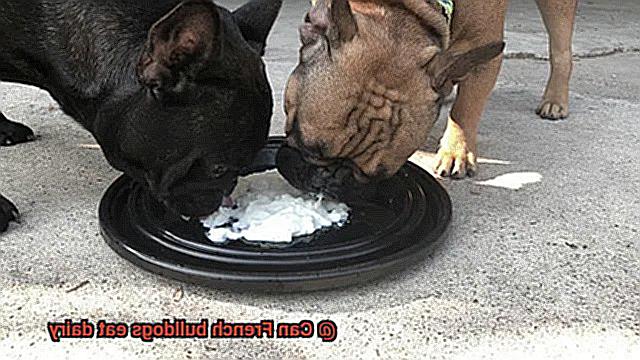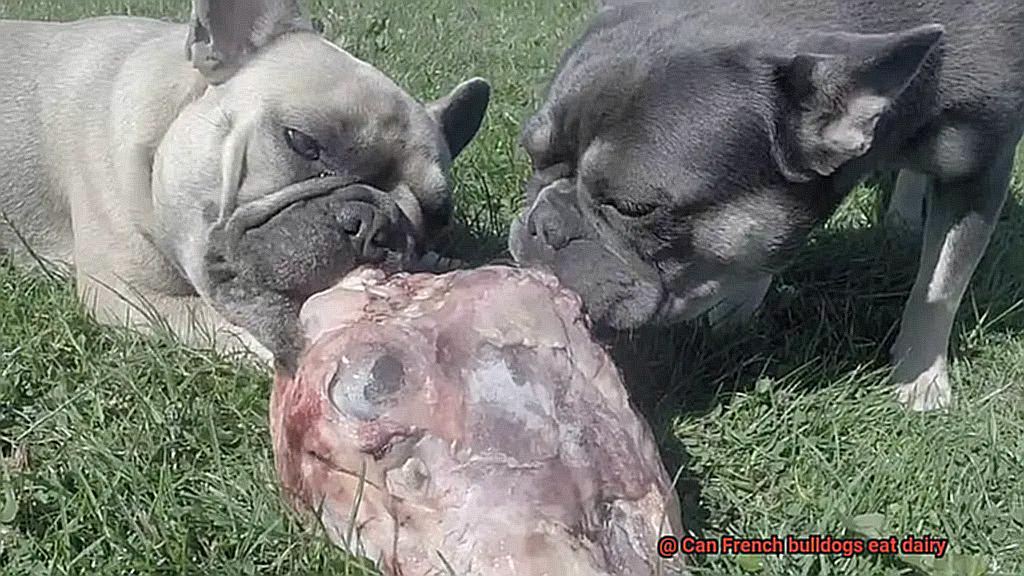Can French bulldogs eat dairy?
We all know that feeling when those big puppy eyes beg for a taste of our delicious dairy treats. But before you hand over that cheesy slice or creamy scoop, let’s take a moment to explore whether it’s safe and healthy for our furry friends.
Today, we’re tackling the age-old question: Can French Bulldogs eat dairy? These adorable little munchkins have their own unique dietary needs, so it’s important to dig into the facts before we dish out any dairy delights.
So, grab your favorite drink and let’s embark on this milky adventure together. We’ll uncover whether our Frenchies can savor those dairy delicacies or if we should keep them far away from the cheeseboard. Get ready to discover the truth behind this creamy conundrum.
Understanding the Basics of Dairy and Lactose Intolerance in Dogs
Contents
- 1 Understanding the Basics of Dairy and Lactose Intolerance in Dogs
- 2 Do French Bulldogs Have a Higher Risk of Lactose Intolerance?
- 3 What Dairy Products Are Safe for French Bulldogs to Consume?
- 4 How Much Dairy Should a French Bulldog Eat?
- 5 What Are the Benefits of Feeding Your French Bulldog Dairy Products?
- 6 What Are the Risks of Feeding Your French Bulldog Dairy Products?
- 7 Tips for Introducing Dairy Into Your French Bulldog’s Diet
- 8 Alternatives to Dairy for Your French Bulldog
- 9 Conclusion
French Bulldogs are adorable and lovable companions known for their unique personalities. As a responsible French Bulldog owner, it’s crucial to understand their specific dietary needs and potential food sensitivities. One common issue among dogs, including French Bulldogs, is lactose intolerance. In this guide, we will explore the basics of dairy and lactose intolerance in dogs, with a particular focus on our beloved Frenchies.
What is Lactose Intolerance?
Lactose intolerance occurs when dogs lack the enzyme lactase needed to digest lactose, the sugar found in milk and dairy products. When dogs consume dairy, undigested lactose can lead to gastrointestinal issues like gas, bloating, diarrhea, and stomach discomfort.
Signs of Lactose Intolerance in French Bulldogs:
French Bulldogs may exhibit various symptoms if they are lactose intolerant. Look out for vomiting, diarrhea, excessive gas, abdominal pain, and even skin issues. If your Frenchie experiences these symptoms after consuming dairy, it’s likely they have lactose intolerance.
Severity of Lactose Intolerance:
The severity of lactose intolerance can vary among individual dogs. Some French Bulldogs may tolerate small amounts of dairy without significant symptoms, while others may be more sensitive and react strongly even to a small quantity.
Safe Alternatives to Dairy:
If you want to treat your French Bulldog to something similar to dairy products without causing digestive issues, there are alternatives available. Consider lactose-free milk or yogurt made specifically for dogs as safer options.
Moderation is Key:
Remember that moderation is crucial when offering lactose-free options or small amounts of dairy products to your French Bulldog. Even if the product is lactose-free, excessive consumption can still cause digestive issues.
Consulting Your Veterinarian:
If you’re unsure whether your French Bulldog can consume dairy or if they are experiencing any digestive issues, consult your veterinarian. They can provide personalized advice based on your Frenchie’s specific needs and health condition.
Do French Bulldogs Have a Higher Risk of Lactose Intolerance?
French bulldogs, with their unique characteristics and charming personalities, are beloved pets to many. However, they also have a higher risk of lactose intolerance compared to other dog breeds. Let’s take a closer look at why this is the case.
Deficiency of Lactase Enzyme:
Lactose intolerance occurs when the body lacks or produces insufficient amounts of lactase, the enzyme responsible for breaking down lactose. French bulldogs, like many other dog breeds, have lower levels of lactase compared to other animals. This deficiency makes it difficult for them to digest lactose effectively.
Genetic Predisposition:
The higher risk of lactose intolerance in French bulldogs can be attributed to their genetic makeup. Studies have shown that certain dog breeds, including French bulldogs, are more prone to lactose intolerance due to genetic factors. These genetic predispositions can influence the production and function of lactase enzymes in their bodies.
Digestive Sensitivity:
French bulldogs are known for having sensitive stomachs and digestive systems. This increased sensitivity makes them more susceptible to digestive issues, including lactose intolerance. Even small amounts of lactose can trigger symptoms such as diarrhea, gas, bloating, and stomach discomfort in these dogs.
Individual Variations:
While all French bulldogs have a higher risk of lactose intolerance, the severity can vary from dog to dog. Some may be more sensitive to lactose than others, experiencing more severe symptoms even with minimal exposure to dairy products.

Dietary Recommendations:
To ensure the well-being and comfort of your French bulldog, it is crucial to be aware of their potential lactose intolerance and adjust their diet accordingly. It is generally recommended to avoid feeding them dairy products altogether or opt for lactose-free alternatives.
Fortunately, there are plenty of safe options available that provide the necessary nutrients without the risk of triggering lactose intolerance in French bulldogs. Your veterinarian can provide personalized advice and suggest suitable dietary alternatives to meet your pet’s specific needs.
What Dairy Products Are Safe for French Bulldogs to Consume?
French Bulldogs, those adorable little bundles of joy, may steal our hearts with their unique characteristics and charming personalities, but they also come with a higher risk of lactose intolerance compared to other dog breeds. So, let’s dig deeper into why these cuties can’t handle dairy like the rest of us. It all boils down to a deficiency of the lactase enzyme, which is responsible for breaking down lactose.
French Bulldogs, just like many other dogs, have lower levels of this enzyme in their bodies, making it harder for them to digest lactose effectively. But that’s not all – their genetic makeup also plays a part in this lactose intolerance tale. Studies have shown that certain dog breeds, including French Bulldogs, are more prone to lactose intolerance due to genetic factors. It’s like they were born with a predisposition to struggle with dairy.
And if that wasn’t enough, these precious pups have sensitive stomachs and delicate digestive systems. Yes, you heard it right – they’re like fragile flowers when it comes to digestion. This heightened sensitivity makes them even more susceptible to lactose intolerance and its unpleasant symptoms like diarrhea, gas, bloating, and stomach discomfort. Oh boy.
But here’s the kicker – not all French Bulldogs are created equal when it comes to lactose intolerance. Some may be more sensitive than others, experiencing severe symptoms even with just a tiny bit of dairy exposure. Talk about being unique individuals.
So what should we do? Well, if you want your French bulldog to lead a happy and healthy life (which I’m sure you do), it’s crucial to adjust their diet accordingly. That means saying au revoir to dairy products or opting for lactose-free alternatives that won’t cause any tummy troubles for your furry friend.
Thankfully, there are plenty of safe options out there that provide all the necessary nutrients without the risk of triggering lactose intolerance in French bulldogs. Here are some dairy products that are generally safe for French Bulldogs to consume:
- Plain yogurt: A good source of probiotics, plain yogurt can help promote healthy digestion in French Bulldogs. Just make sure to avoid flavored yogurts that may contain added sugars or artificial sweeteners.
- Cottage cheese: This creamy delight is a great source of protein and calcium for French Bulldogs. Opt for low-fat or non-fat varieties to avoid excessive fat intake.
- Cheese: While some French Bulldogs may tolerate small amounts of cheese, it’s important to choose low-fat options and give it as an occasional treat rather than a regular part of their diet.
However, it’s always best to consult with a veterinarian before introducing any new dairy products into a French Bulldog’s diet. They can provide specific recommendations based on the individual dog’s health and dietary needs.
How Much Dairy Should a French Bulldog Eat?
While it’s tempting to indulge them with a tasty treat, it’s important to consider their digestive health and potential lactose intolerance before letting them dive into the dairy aisle.
French Bulldogs and Digestive Issues: A Love-Hate Relationship
French Bulldogs are notorious for their sensitive stomachs and delicate digestive systems. Many of these adorable pups are lactose intolerant, meaning they lack the necessary enzyme, lactase, to break down lactose, the sugar found in milk and other dairy products. This can lead to some unpleasant gastrointestinal symptoms such as diarrhea, vomiting, and gas. Yikes.
Moderation is Key
While some French Bulldogs may tolerate small amounts of dairy without any issues, it’s generally recommended to limit their consumption or avoid it altogether. If you do choose to give your Frenchie a taste of dairy goodness, start with small quantities and monitor their reaction closely. Signs of intolerance may include an upset stomach, loose stools, or excessive gas.

Low-Lactose Options: A Light at the End of the Tunnel

If you’re determined to treat your French Bulldog to some dairy delights, there are a few low-lactose options that may be better tolerated. Yogurt and cottage cheese are examples of dairy products that typically contain lower levels of lactose. However, even these should be given in moderation and only if your furry friend shows no signs of discomfort.
Remember: Balance is Key

As much as we all love spoiling our French Bulldogs with treats, it’s crucial to remember that dairy should never replace a balanced diet. These adorable pups require a diet rich in protein, healthy fats, and carbohydrates from sources like meat, fish, fruits, and vegetables. Dairy should always be considered an occasional indulgence rather than a staple in their diet.
Consult the Experts
If you’re concerned about meeting your French Bulldog’s nutritional needs without including dairy, it’s always a good idea to consult with a veterinarian or a canine nutritionist. They can provide guidance and recommendations on alternative sources of essential nutrients to keep your Frenchie healthy and happy.
What Are the Benefits of Feeding Your French Bulldog Dairy Products?
While dogs are primarily carnivores, incorporating certain dairy products into their meals can offer some surprising benefits. In this blog post, we’ll explore the moo-velous benefits of feeding your French Bulldog dairy products and why they can be a great addition to their diet.
Strong Bones and Teeth:
Calcium is essential for healthy bone and teeth development in French Bulldogs. Dairy products like milk, cheese, and yogurt are rich sources of calcium. Regular intake of these calcium-rich goodies can help maintain strong bones and teeth, ensuring your Frenchie stays active and playful.
Essential Nutrients:

Dairy products contain a range of essential nutrients that support overall growth and immune function in French Bulldogs. Protein helps build and repair tissues, while vitamins (A, D, and B12) and minerals (phosphorus and potassium) contribute to a healthy immune system, skin, and coat.
Happy Tummies:
Yogurt, a popular dairy product, contains probiotics – beneficial bacteria that promote good gut health. Probiotics aid digestion and nutrient absorption, making sure your French Bulldog’s tummy stays happy and healthy. If your Frenchie has a sensitive stomach or occasional digestive issues, adding yogurt to their diet may provide relief.
Weight Management:
Maintaining a healthy weight is crucial for French Bulldogs to avoid joint problems and other health issues. Dairy products can be included as low-calorie snack options for dogs watching their weight. Treat your Frenchie to some cottage cheese or low-fat yogurt for a guilt-free and delicious treat.
Picky Eater Solution:
Is your French Bulldog a picky eater? Adding a sprinkle of cheese or a dollop of yogurt to their regular meals can make them more enticing and flavorful. It’s a win-win situation: your Frenchie will enjoy their meal, and you’ll have peace of mind knowing they’re getting the nutrition they need.
Hydration Boost:
Some dairy products, like cottage cheese and plain yogurt, have high water content, making them an excellent source of hydration for your French Bulldog. This is especially beneficial during hot weather or after vigorous exercise when dogs need to replenish fluids.
Training Treats:
Dairy products, such as cheese cubes or yogurt drops, can be used as irresistible training treats for your French Bulldog. Rewarding them with these tasty morsels during training sessions will motivate them to learn new commands and behaviors.
What Are the Risks of Feeding Your French Bulldog Dairy Products?
While dairy products may seem like a tasty treat or a convenient source of important nutrients, there are several risks associated with feeding them to French Bulldogs. In this article, we will explore these risks and help you make informed decisions about your dog’s diet.
Lactose intolerance:
Like many other dog breeds, French Bulldogs can be lactose intolerant. Lactose is a sugar found in milk and dairy products, and dogs lack the necessary enzyme, lactase, to properly digest it. Feeding your French Bulldog dairy products can lead to digestive issues such as gas, bloating, diarrhea, and stomach discomfort.
Upset stomach:
French Bulldogs have sensitive stomachs, and dairy products can be heavy on their digestive system. The high fat content in many dairy products can cause an upset stomach, leading to vomiting and diarrhea. Some dogs may also have allergic reactions to dairy, resulting in skin irritations or itching.
Obesity:
Dairy products are often high in fat and calories. Feeding your French Bulldog excessive amounts of dairy can contribute to weight gain and obesity. Since French Bulldogs are already prone to weight gain due to their small stature and low activity levels, it’s important to monitor their diet and avoid unnecessary calories.
Nutritional imbalance:
While dairy products contain important nutrients like calcium and protein, they should not be relied upon as the sole source of these nutrients for your French Bulldog. A balanced diet that includes appropriate amounts of meat, vegetables, grains, and other dog-friendly foods is essential for their overall health. Relying too heavily on dairy can lead to nutritional imbalances and deficiencies.
Allergies:
Some French Bulldogs may have allergies or sensitivities to certain dairy ingredients like casein or whey protein. These allergies can manifest as skin rashes, itching, ear infections, or gastrointestinal issues. It’s important to observe your dog’s reaction after consuming dairy products and consult with a veterinarian if any adverse symptoms occur.
Potential for pancreatitis:
Certain dairy products, particularly those high in fat like cheese or butter, can increase the risk of pancreatitis in dogs. Pancreatitis is an inflammation of the pancreas that can cause severe abdominal pain, vomiting, and loss of appetite. French Bulldogs are predisposed to pancreatitis, so it’s crucial to avoid feeding them high-fat dairy products.
Tips for Introducing Dairy Into Your French Bulldog’s Diet
French Bulldogs are adorable and lovable companions, but their sensitive digestive systems require careful consideration when it comes to introducing new foods. Many dog owners wonder if it is safe to give their French Bulldogs dairy products. In this article, we will provide you with valuable tips to help you introduce dairy into your French Bulldog’s diet.
Start Slowly:
Introducing any new food into your French Bulldog’s diet should be done gradually. Begin by offering small amounts of dairy and observe your dog’s reaction. If there are no adverse effects, you can continue to increase the portion size over time.
Choose Low-Lactose Options:
French Bulldogs are more prone to lactose intolerance, so it is important to select dairy products that are low in lactose. Opt for lactose-free or low-lactose options such as lactose-free milk, yogurt, or cheese.
Consider Yogurt:
Yogurt can be a good dairy option for French Bulldogs as it contains probiotics that promote a healthy gut. Look for plain, unsweetened yogurt without any artificial additives or sweeteners. Avoid flavored yogurts as they often contain high amounts of sugar.
Mind the Cheese:
When offering cheese to your French Bulldog, choose varieties that are lower in fat. High-fat cheeses can lead to weight gain and potential gastrointestinal issues. Stick to small portions and use cheese as an occasional treat rather than a staple in their diet.
Watch for Allergies:
Some French Bulldogs may be allergic or sensitive to dairy products. Watch out for signs of allergies such as itching, excessive licking, digestive upset, or respiratory issues. If you notice any of these symptoms, consult with your veterinarian and consider eliminating dairy from your dog’s diet.
Individualize Their Diet:
Each dog is unique, and it’s essential to pay attention to their individual needs and reactions. If you find that your French Bulldog doesn’t tolerate dairy well, it’s best to avoid it altogether. Always consult with your veterinarian before making any significant changes to your French Bulldog’s diet.
Alternatives to Dairy for Your French Bulldog
Don’t fret. There are plenty of alternatives that will satisfy their taste buds without causing any digestive issues. As an expert in French Bulldog nutrition, I’ve got you covered with some paw-some alternatives to dairy that your furry friend will love.”
- Lactose-Free Milk: Just like humans, some dogs have difficulty digesting lactose. Luckily, there are lactose-free milk options available in most grocery stores. These milks have the lactose removed, making them easier on your French Bulldog’s tummy. You can use lactose-free milk as a substitute for regular milk in recipes or as a standalone drink for your pup.
- Plant-Based Milk: For those looking for a non-dairy option, plant-based milks like almond milk, soy milk, or coconut milk are great alternatives. These milks are typically lactose-free and can provide your Frenchie with essential nutrients without the digestive issues associated with dairy.
- Lactose-Free Yogurt: Yogurt is a tasty treat that many French Bulldogs enjoy. However, the lactose content in traditional yogurt can cause tummy troubles. Thankfully, there are lactose-free yogurt options available in the market. You can also opt for plain, unsweetened yogurt made from coconut or almond milk to provide your Frenchie with probiotic benefits without the lactose.
- Non-Dairy Cheese: Cheese is another dairy product that can be problematic for French Bulldogs due to lactose content. But fear not. There are non-dairy cheese alternatives that can be used as substitutes. Vegan cheese made from ingredients like nuts or soy can be a great option. Just keep in mind that not all dogs may enjoy the taste of vegan cheese, so it may take some trial and error to find one that your Frenchie loves.
Conclusion
In conclusion, it is not recommended to feed French bulldogs dairy products.
While some dogs may tolerate small amounts of dairy, many French bulldogs are lactose intolerant and can experience digestive issues such as diarrhea and stomach upset. Dairy products also contain high levels of fat and can contribute to weight gain and obesity in these already prone-to-weight-gain dogs.
It’s always best to consult with your veterinarian before introducing any new food into your French bulldog’s diet.




